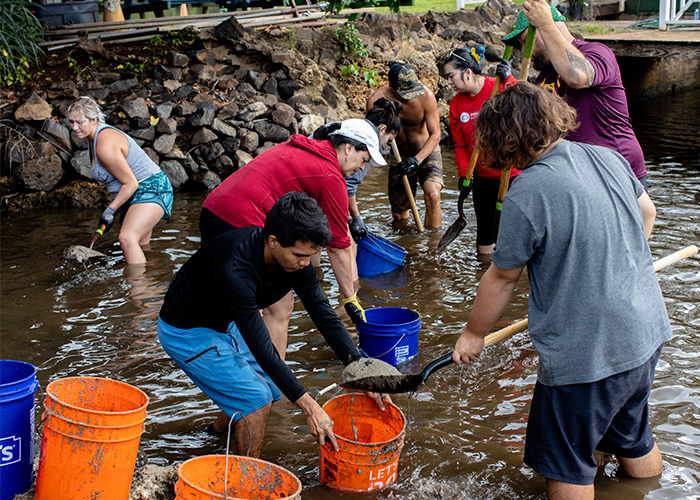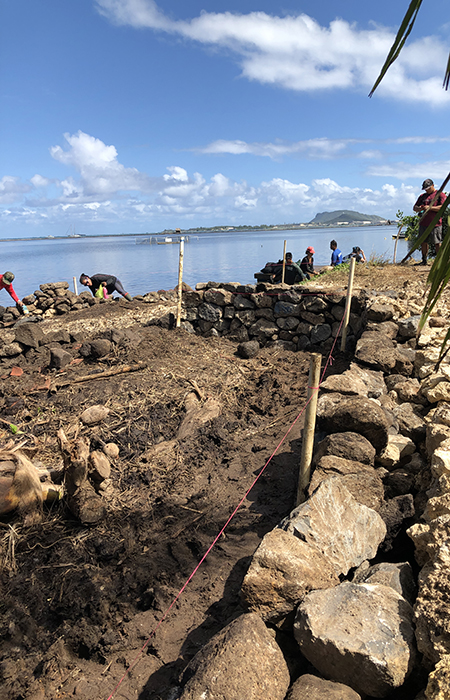Resources
The collaborators in our group are doing interesting and important work. On this page, we outline resources that members of the Indigenous Aquaculture Collaborative Network have developed. We also include relevant links to tools and resources that complement the work of our Indigenous Aquaculture community. We invite you to dig in to learn more about the efforts in our unique places.
- The Kūlana Noiʻi provides guidance for building and sustaining long-term relationships between communities and researchers, and is a best-practice tool for our partnerships. The Kūlana Noiʻi was developed in partnership with Kuaʻāina Ulu ʻAuamo, and Hawaiʻi Sea Grant.
- Clam Garden Network: a network of practitioners, managers and researchers in the Northwest Coast interested in the cultural and ecological importance of clam gardens and traditional management.
- Partners in our Indigenous Aquaculture Collaborative Network are working with the International Union for Conservation of Nature (IUCN) World Conservation Congress 2020 Commission on Ecosystem Management (CEM) to support the creation of the Global Indigenous Network for Aquaculture.
- “Pacific Northwest Tribes Face Climate Change with Agriculture Ancient Practice,” a story in NPR published in 2020 about project partner, Swinomish Indian Tribal Community.
- “A Tale to Warm the Cockles of Your Heart,” podcast by Gastropod featuring the restoration of a culturally important shellfish by project partners, the Suquamish Tribe and Puget Sound Restoration Fund.
- Communities around the Hawaiian Islands come together at the grassroots to care for their lands and waters — their ‘āina. See the library of videos by the Kuaʻāina Ulu ʻAuamo network of fishponds and stewardship efforts.
- There are growing efforts to restore clam garden practices emanating from First Nations in British Columbia — for example, a six-year restoration project with Parks Canada and the W̱SÁNEĆ and Hul’q’umi’num Nations, seen here in a short video clip. More efforts are beginning to emerge in Alaska and Washington.
- Tlingit intertidal stone fish traps and pulse fishing are used in Klawock, SE Alaska — see this video of project partners practices with commentary.
- Coastal Voices A diverse group of Indigenous leaders, knowledge holders, scientists and artists from British Columbia and Alaska reflect on socially just and ecologically sustainable strategies to navigate the changes that come with the recovery of sea otters. See the short film.
- Swinomish tribal community members visited a clam garden in British Columbia. Clam gardens are an ancient Indigenous technology of carefully tended terraced beaches that increase clam productivity. Watch this video to learn more about clam gardens and why they are so important to Indigenous people. See the video.
- Washington Sea Grant works to improve justice, equity, diversity, inclusion throughout all its programming in research, technical expertise, and educational activities that support the responsible use and conservation of ocean and coastal ecosystems. The WSG 10-year Diversity, Equity and Inclusion (DEI) roadmap outlines 13 goals and strategies for internal and external organizational change.
- Loko I’a Needs Assessment A report reflecting the needs, interests, visions, and ideas of the Hui Mālama Loko Iʻa community of fishpond managers, landowners, and stewardship organizations to inform adaptation of fishpond practices toward their resilience, adaptation, and sustainability in the face of a changing climate. The report was synthesized by a collaborative of Kuaʻāina Ulu ʻAuamo, the University of Hawaiʻi Sea Grant College Program, and the Pacific Islands Climate Adaptation Science Center.


